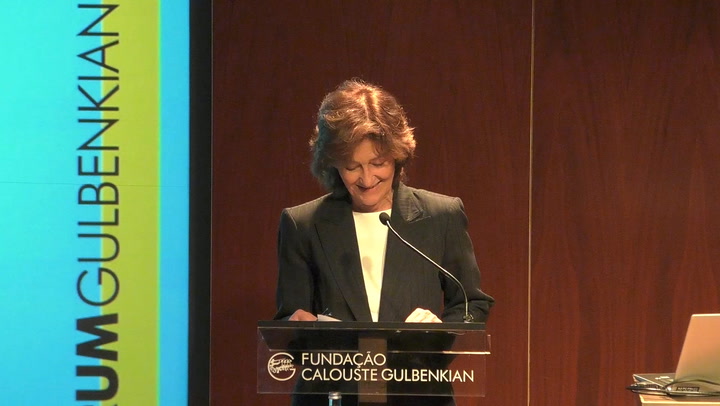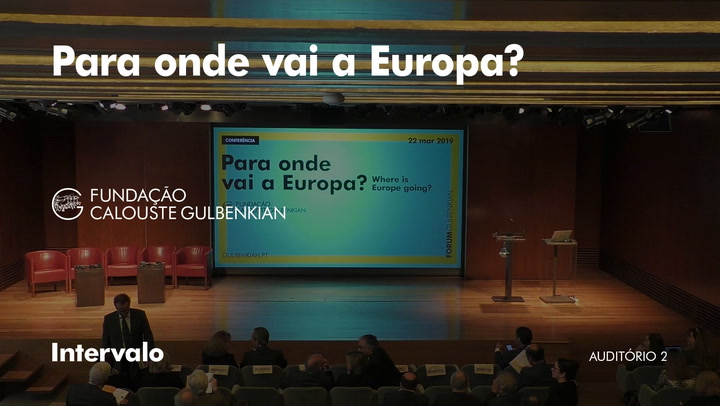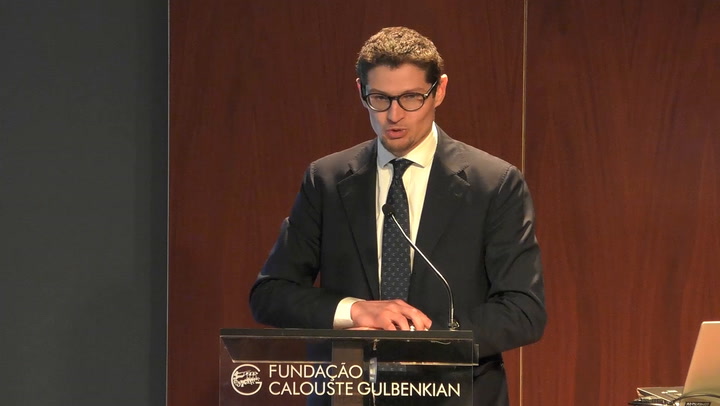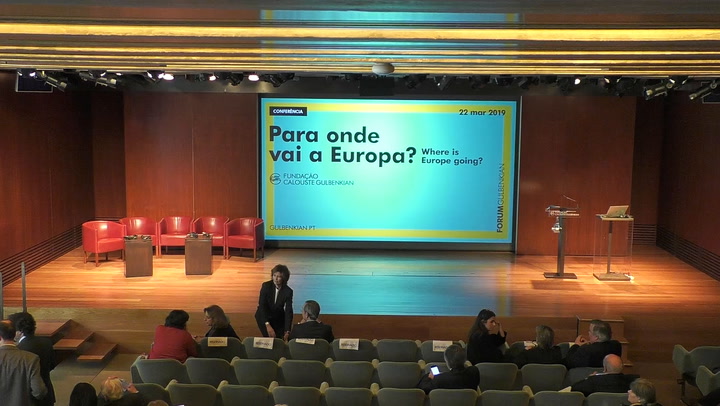Where is Europe going?
International Conference
Event Slider
Date
- / Cancelled / Sold out
Location
Auditorium 2 Calouste Gulbenkian FoundationConference with live streaming via Facebook
STREAMING
CONFERENCE PROGRAM
9:30 am – 9:45 am Opening Session
Isabel Mota, President of the Calouste Gulbenkian Foundation
9:45 am – 10:30 am Europe in the global order of the 21st century
Mário Centeno, Minister of Finance of the Portuguese Government and President of the Eurogroup
10:30 am – 11:00 am Coffee-Break
11:00 am – 12:30 am Reform of the euro, financial and budgetary perspectives of the European Union
Introduction to the topic: Giorgos Papakonstantinou, former Minister of Finance of the Greek Government and Professor at the School of Transnational Governance at the European University Institute, Florence
Roundtable
Elisa Ferreira, Deputy Governor of the Banco de Portugal
Klaus Regling, Economist and Managing Director of the European Stability Mechanism
Vitor Bento, Economist and Chairman of SIBS
Vitor Martins, Economist and former Secretary of State for European Affairs of the Portuguese Government (moderator)
12:30 am – 2:00 pm Lunch
2:00 pm – 3:30 pm The European Union after Brexit:
Centrifugal tensions and differentiated integration
Introduction to the topic: Federico Fabbrini, Director of the Brexit Institute at the Law and Government School, University of Dublin
Roundtable
António Cabral, Economist and former Deputy Director-General for Economic and Financial Affairs of the European Commission
Paulo Portas, former Minister and Deputy Prime Minister of the Portuguese Government
Luísa Meireles, Journalist and Director of Information of the Portuguese News Agency – LUSA (moderator)
3:30 pm – 4:00 pm Coffee-Break
4:00 pm – 5:30 pm Populism and the elections to the European Parliament
Introduction to the topic: Carlos Jalali, Professor of Political Science at the University of Aveiro
Roundtable
Madeleine de Cock Buning, Professor and former Chair of the European Commission’s High-Level Expert Group on fake news and disinformation
Mark Leonard, Director of the European Council on Foreign Relations
Marlene Wind, Director of the Centre for European Politics at the University of Copenhagen
Miguel Poiares Maduro, Director of the School of Transnational Governance at the European University Institute, Florence (moderator)
5:30 pm – 6:00 pm Where is Europe going?
Joseph Weiler, Professor at the New York University School of Law and Senior Fellow at the Centre for European Studies at the Harvard University.
Download Programme
SPEAKERS
Alex Ellis joined Department for Exiting the European Union (DExEU) as Director General in January 2017. Prior to this, he was the British Ambassador to Brazil, from 2013 to 2016. Alex has extensive experience in the European Union, mainly in Brussels, as Member of the Cabinet of the President of the European Commission. In this role, he had responsibility for energy, climate change, competition, development, trade and strategy. Prior to this, he worked at the United Kingdom Representation to the European Union, particularly on the negotiations to establish the euro, the 7 year budget, and then institutional issues including the Treaty of Nice. He was also the Whitehall Coordinator for the enlargement negotiations which concluded in 2003. As well as serving as British Ambassador to Portugal from 2007 to 2010, Alex Ellis has also been the Director of Strategy in the Foreign Office and head of the European Union and economic issues team in the British Embassy in Madrid. He started his civil service career as part of the team supporting the transition to multi-party democracy in South Africa, following the release of Nelson Mandela.
António Cabral graduated in Economics from the Higher Institute of Economic and Financial Sciences (ISCEF) in 1971 and began his professional career in the Technical Secretariat of the Council Presidency, later integrated into the Ministry of Finance as the Central Planning Department. In 1978, he joined the Banco de Portugal as Deputy Director of the Department of Statistics and Economic Studies. From 1988 to 2014, he was an official of the European Commission, where he worked until 2004 at the Directorate General of Economic and Financial Affairs, where he became Deputy Director-General. From 2004 to 2014, he was Special Adviser to the President of the Commission, José Manuel Durão Barroso. He taught different subjects at the Portuguese Catholic University, participated in several conferences and published various articles and books.
Carlos Jalali holds a PhD in Political Science from the University of Oxford. He is an Associate Professor at the University of Aveiro, where he heads the Master’s degree in Political Science and the Doctoral Program of the University of Aveiro and the University of Beira Interior (UA-UBI) in Political Science. He also coordinates the Public Policies, Institutions and Innovation line in the research unit on governance, competitiveness and public policies (GOVCOPP). His work focuses on political institutions, party systems, political communication and electoral behaviour in Portugal. He is the author of several articles and chapters in national and international scientific magazines and books, including, most recently, the essay Partidos e Sistemas Partidários (Francisco Manuel dos Santos Foundation, 2017). He has been the President of the Portuguese Association of Political Science since 2016.
Elisa Ferreira holds a degree in Economics from the University of Porto (1977), a Master’s and a Doctorate from the University of Reading (1981-1985), with Equivalence to a PhD in Economics from the University of Porto (1986). She has been a Director of Banco de Portugal since June 2016 and became Vice-Governor of the said institution in September 2017. She was a Member of the European Parliament (2004-2016) and, throughout this period, has been a Member of the Committee on Economic and Monetary Affairs, where she was the Coordinator and Spokeswoman for the Parliamentary Group of Socialists and Democrats. She was also the Rapporteur (coordinator) of the European Parliament’s positions on various legislative proposals concerning the financial system and on economic, budgetary and tax policy matters. Before joining the European Parliament, she was a Member of the Portuguese Parliament (2002-2004), Minister for Planning (1999-2002) and Minister for the Environment (1995-1999) of the Portuguese Government. She was also Vice-President of the Porto Industrial Association (from 1992 to 1994) and Vice-President of the Commission for the North Region Coordination (1998-1992), which she joined in 1979. Between 1989 and 1992, she was a Member of the Board of Directors of the Portuguese National Statistical Institute. She has been a Lecturer at the School of Economics of the University of Porto since 1977.
Federico Fabbrini is Full Professor of European Law at the School of Law & Government of Dublin City University (DCU) and the Principal of the Brexit Institute. He holds a PhD in Law from the European University Institute and he is a fully qualified attorney in Italy. He previously held academic positions in the Netherlands and Denmark. He is the author of Fundamental Rights in Europe (Oxford University Press, 2014) and Economic Governance in Europe (Oxford University Press, 2016) as well as the editor, among others, of The Law & Politics of Brexit (Oxford University Press, 2017). He regularly engages with European Union institutions and national governments, and has presented his work to, among others, the European Parliament, the European Central Bank, the European Commission, the European Court of Justice, the European Union Fundamental Rights Agency, the European Free Trade Association (EFTA) Court, and the United Kingdom Financial Conduct Authority.
Giorgos Papakonstantinou is an Economist who has served politically at the highest level, as Cabinet Minister of the Greek Government, Member of Greek Parliament and Member of the European Parliament. As Greece’s Finance Minister, at the outset of the Eurozone crisis, he played a key role in the design and negotiation of Greece’s support programme by the European Union and the International Monetary Fund with its associated economic and financial policies. Subsequently, as Minister of Environment and Energy, he pursued policies to advance Greece’s sustainable growth agenda. Giorgos holds a B.Sc. from the London School of Economics, an M.A from New York University and a PhD in Economics from the London School of Economics. Since leaving public office, his work has focused on economic and financial policy-related analysis and governance issues. He is currently part-time Professor at the School of Transnational Governance of the European University Institute where he is co-leading the Transformation of Global Governance project, a major research and policy analysis endeavor whose aim is to decipher the transformation of global governance under way in a series of fields and to assess the effectiveness of the emerging global governance arrangements. His publications include Game Over: The Inside Story of the Greek Crisis (2016) and the forthcoming Post-Crisis Europe (Agenda Publishing, 2019).
Isabel Mota has been Chairman of the Board of Directors of the Calouste Gulbenkian Foundation since May 2017 and was a Member of the Board of Directors of the said Foundation between 1999 and 2017. She is also Chairman of the Supervisory Board of Partex Holding, Chairman of the Board of Directors of Maison du Portugal – André de Gouveia, of the Cité Internationale Universitaire de Paris and has been a non-executive Member of the Board of Directors of Banco Santander-Totta since July 2015. She has a degree in Finance from the University of Lisbon (1973), she was Assistant Professor at the Higher Institute of Economics (1973-1975), Deputy Director of the Foreign Economic Cooperation Office of the Ministry of Finance (1978-1986) and Counsellor at the Permanent Representation of Portugal in Brussels (1986). Later, she became the Portuguese Government’s Secretary of State for Planning and Regional Development (1987-1995) and headed the negotiations with the European Union on the Structural and Cohesion Funds for Portugal. She was also Director of the Institute for the Training of Executives of the Nova University of Lisboa (1977) and Member of the General Board of Telecel Vodafone (2001-2003). She coordinated the drafting of the National Strategy for Sustainable Development for Portugal (2004) as well. In addition, she was Counsellor of the Economic and Social Council of Portugal (until 2016) and she has been a member of the Portuguese Council of Honorific Orders since 2011.
Joseph Weiler is University Professor at New York University (NYU) Law School and Senior Fellow at the Centre for European Studies at Harvard. Until recently he served as President of the European University Institute, in Florence. Previously he served as Manley Hudson Professor of International Law at Harvard Law School. Professor Weiler is Editor-in-Chief of the European Journal of International Law (EJIL) and the International Journal of Constitutional Law (ICON).
Klaus Regling is the current and first Managing Director of the European Stability Mechanism, appointed by the Board of Governors for a renewable term of five years. He is also the Chief Executive Officer of the European Financial Stability Facility (EFSF), a position he has held since the creation of the EFSF in June 2010. Klaus Regling has worked for 40 years as an Economist in senior positions in the public and the private sector in Europe, Asia, and the United States, including a decade with the International Monetary Fund (IMF) in Washington and Jakarta and a decade with the German Ministry of Finance where he prepared Economic and Monetary Union in Europe. From 2001 to 2008, he was Director General for Economic and Financial Affairs of the European Commission. During 2008-2009, he spent a year at the Lee Kuan Yew School of Public Policy in Singapore where he researched financial and monetary integration in Asia. Subsequently, he opened an economic and financial consultancy in Brussels. Previously, Mr. Regling had gained experience in the private sector as Managing Director of the Moore Capital Strategy Group in London (1999-2001) and as an Economist with the German Bankers’ Association. Mr. Regling studied Economics at the Universities of Hamburg and Regensburg.
Luísa Meireles holds a Law degree from the Law School of the University of Lisbon, and she stopped practising law after ten years to devote herself entirely to journalism. At that point, she started working permanently in the newspaper Expresso (1989). She has a postgraduate degree in European Studies from the Institute of European Studies of the Catholic University of Lisbon and the auditing course of the Institute of National Defense. She is a Member of the Eurodefense-Portugal Studies Centre and of the Euromed-IHEDN Association (Institut des Hautes Études de Défense Nationale). As a Journalist, she was a special envoy to report the ending years of the Soviet Union and the transition of regimes throughout Central and Eastern Europe, including the Balkan wars. She specialised in the areas of Defence and Security and European Affairs. She was the Editor of the International Department of the newspaper Expresso (2000-2006) and Editor-in-Chief in the Policy section of the said newspaper (2006 and 2018). In October of 2018, she took the position of Information Director of the Portuguese News Agency – Lusa. She published the books E Depois do Iraque? (2003), in partnership with General Loureiro dos Santos, and General Loureiro dos Santos – uma biografia (2018).
Madeleine de Cock Buning is part-time Professor at the European University Institute (EUI) School of Transnational Governance. In this role, she leads work on Digital Politics, Economy and Societies. In 2018 she was Chair of the European Commission’s High-Level Expert Group (HLEG) on fake news and disinformation, assigned to provide the Commission with options on how to react to the dissemination of fake news both online and offline. She is currently President of the Board of Commissioners Dutch Media Authority, and was until 2017 the Chair of the European Regulators Group for Audio Visual Media Services (ERGA). She is Honorary Judge to the Court of Appeal in The Hague and Professor in the Faculty of Law, Economy and Governance at the Utrecht University with a chair in Copyright Law and Media and Communication Law.
Mário Centeno is the Portuguese Minister of Finance (since 2015), he is the President of the Eurogroup and Chairman of the Board of Governors of the European Stability Mechanism (since 2018). He has a degree in Economics from the Higher Institute of Economics and Management (ISEG) at the Technical University of Lisbon (1990), a Master’s degree in Applied Mathematics from the same Institute (1993), a Master’s degree in Economics from the Harvard University (1995-2000) and a PhD in Economics from this University (1995-2000). Mário Centeno is a Full Professor of ISEG, and he has published, within the scope of his research areas of interest (Labour Economics, Econometrics, Microeconomics and Contract Theory), numerous books and scientific articles. Formerly an Economist at the Banco de Portugal (2000-2004), Member of the Editorial Board of the Portuguese Economic Journal (since 2001), Member of the Executive Committee of the European Association of Labour Economists (2003-2005), Deputy Director of the Department of Economic Studies of the Banco de Portugal (2004-2013), Member of the Economic Policy Committee of the European Commission (2004-2013), Member of the Commission on the White Paper on Labour Relations (2006-2007), Chairman of the Working Group for the Development of Macroeconomic Statistics, in the Higher Council of Statistics (2007-2013) and Consultant of the Board of Directors of Banco de Portugal (since 2014).
Mark Leonard is co-Founder and Director of the European Council on Foreign Relations, the first pan-European think tank. His topics of focus include geopolitics and geo-economics, China, and European Union institutions. Leonard writes a syndicated column on global affairs for Project Syndicate. Previously he worked as Director of Foreign Policy at the Centre for European Reform and as Director of the Foreign Policy Centre, a think tank he founded at the age of 24 under the patronage of former British Prime Minister Tony Blair. In the 1990s, Leonard worked for the think tank Demos where his Britain™ report was credited with launching ‘Cool Britannia’. Mark has spent time in Washington, D.C. as a transatlantic fellow at the German Marshall Fund of the United States, and in Beijing as a visiting scholar at the Chinese Academy for Social Sciences. He was also Chairman of the World Economic Forum’s Global Agenda Council on Geo-economics until 2016. Honored as a “Young Global Leader” of the World Economic Forum, he is a regular speaker and prolific writer and commentator on global issues, the future of Europe, China’s internal politics and the practice of diplomacy and business in a networked world. Leonard is author of two best-selling books: Why Europe will run the 21st Century, published in 2005 and translated into 19 languages; and What does China think?, published in 2008 and translated into 15 languages.
Marlene Wind is Professor of Political Science and Director at the Centre of European Politics. She is also Professor at iCourts, Centre of Excellence, at the Faculty of Law, both at the University of Copenhagen. From 2018-2019 she is a Visiting Professor and Global Law Fellow at University of Leuven, Belgium. Professor Wind holds a PhD from the European University Institute (EUI), in Florence, where she has also been sitting on the Board for 12 years. She has published extensively on European affairs, law and politics over the past 25 years and has just published a book on Populism and European integration: The Tribalization of Europe – a defense of our liberal values, that will come out this year (so far) in Spanish, English and Danish. Marlene Wind has been a regular commentator on European affairs in Danish media for several decades and has a bi-monthly column in the leading Danish daily Berlingske.
Miguel Poiares Maduro is Director of the School of Transnational Governance of the European University Institute and was Minister in the Cabinet of the Prime Minister and for Regional Development of the Portuguese Government (2013-2015). He holds a Law degree from the Law School of the University of Lisbon and a Doctorate from the European University Institute in Florence, where he obtained the awards for best doctoral thesis and for best researcher from the Law Department. He was Advocate General at the Court of Justice of the European Communities until October 2009. He was also a Member of the European Union High Level Group on Freedom of the Media and Pluralism; Professor at the Law School of the Nova University of Lisboa, which he continues to collaborate with; Visiting Lecturer at the Yale Law School, of the Centre for Constitutional Studies in Madrid, the University of Chicago and of the London School of Economics. He also teaches at the Portuguese Catholic University and at the College of Europe. He was also Chairman of the Governance Committee of the Fédération Internationale de Football Association (FIFA) between 2016 and 2017. He is the author of several publications, including: We the Court – The European Court of Justice and the European Economic Constitution (Hart Publishing, 1997); A Constituição Plural – Constitutionalismo e União Europeia (Principia, 2006) and The Past and Future of EU Law (with Loic Azoulai: Hart Publishing, 2009). He was honoured in 2010 with the Gulbenkian Prize for Science.
Paulo Portas holds a Law degree from the Portuguese Catholic University, and he has worked mainly as a Journalist and as a Politician. Having started as a Journalist in the newspapers O Tempo, A Tarde and O Semanário, he later founded the newspaper O Independente, where he worked as Journalist and Director (1988-1995). He was also President of CDS – Partido Popular, Municipal Politician, Member of the Portuguese Parliament, Member of the European Parliament, Minister of State, Defence and Maritime Affairs (2002-2005), Minister of State and Foreign Affairs (2011- 2013) and Deputy Prime Minister (2013-2015) of the Portuguese Government. After leaving his active political life in 2016, Paulo Portas is currently Professor at the Nova School of Business and Economics of the Nova University of Lisboa, Vice-President of the Portuguese Chamber of Commerce and Industry, Chairman of the Mota-Engil Strategic Advisory Board for Latin America, Counsellor of Mex Gas International, political commentator, speaker and lecturer.
Vitor Bento holds a degree in Economics, a Master’s degree in Philosophy, a certificate in Corporate Governance from INSEAD (Insead IDP-C), and has completed his PhD curricular program in Strategic Studies (thesis in progress). He is Chairman of the Board of Directors of SIBS, President of the European Card Payments Association, Board Member of PWNLisbon, as well as of the Board of the Catholic University and of the General Board of the Portuguese Institute of Corporate Governance and Chairman of the Audit Board of CoRe Capital. He is also a Consultant for the Calouste Gulbenkian Foundation and Semapa. Previously, he was State Advisor and, in addition to being business manager in the private sector, since 2000, he has also held various positions in the public sector, such as Director of the Banco de Portugal, Director-General of the Treasury, President of the Public Credit Board and Founder and first President of the Treasury and the Portuguese Public Debt Management Agency. At the European level, he was a Member of the Subcommittee on Exchange Policy of the European Central Banks and of the Monetary Committee of the European Economic Community. He was also part of the Working Group on the possibilities of European debt mutualisation and the creation of Eurobills, by appointment of the President of the European Commission. Vitor Bento is a Full Professor at the Higher Institute of Social and Political Sciences and a visiting Executive for the training of executives in the Nova Business School of the Nova University of Lisboa. He is a regular commentator in the Portuguese media, and he has published several books – among them, the following stand out: Os Estados Nacionais e a Economia Global (Almedina, 2004); Perceber a Crise para Encontrar o Caminho (Bnomics, 2009); O Nó Cego da Economia (Bnomics, 2010); Economia, Moral e Política (Francisco Manuel dos Santos Foundation, 2011); Euro Forte, Euro Fraco (Bnomics, 2013); and De Portugal, da Europa e do Mundo (2018, Relógio D’Água).
Vitor Martins is an Economist. He headed the European Integration Office of the Ministry of Industry from 1979 to 1985 and was a Member of the European Integration Committee which negotiated Portugal’s accession to the European Communities. From 1985 to 1995, he was the Portuguese Government’s Secretary of State for European Affairs and participated in the negotiations of the Single European Act, the Maastricht Treaty, the Schengen Agreement and the Delors I and II Packages. Between 1996 and 2000, he coordinated the Enlargement Unit of the Centre for European Policy Studies (CEPS) and was part of the European Guidance Committee of the Jacques Delors Institute. Between October 2004 and July 2005, he presided over the public Portuguese bank Caixa Geral de Depósitos (CGD). Currently, he is a non-executive Member of the Administration of the Luso-American Foundation for Development and of the Board of Directors of the Bissaya Barreto Foundation. He has also been the Chairman of the Fundão Municipal Assembly since 2002.





